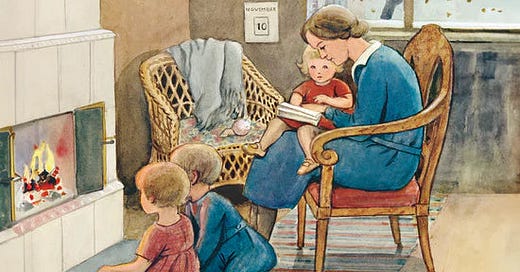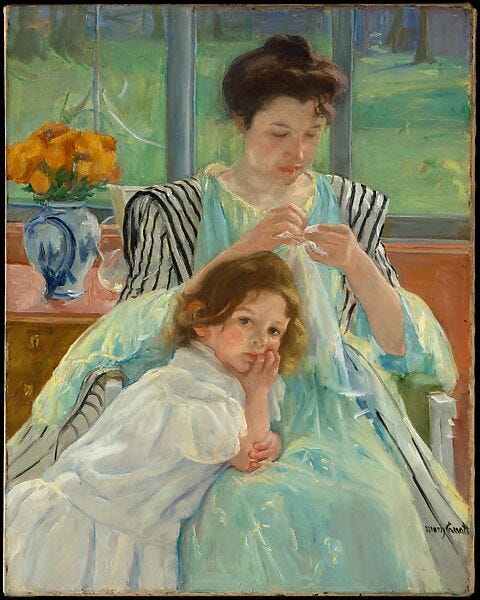What to Do with Little Children at Home
"Help, I need a homeschool curriculum for my 3 year old"
The other day, I saw yet another post in an online mom’s group from a mother of a newly 3 year old daughter asking what homeschool curriculum was recommended for that age. There are many of these moms, and posts, and most all seem to be underscored by an anxiety about “what do I do with this young child I have at home that’s no longer a baby/toddler but also can’t read/be sent to school”?
Such moms (I was one of them, to an extent) have often spent the under-3 years driving around to various playgroups and toddler activities, toting their child to the grocery store and bank, with the child generally gamely being along for the ride. Once the child gets older, however, they recognize that now the time has come for a new phase to begin, but they just don’t know *how* or *what* that should look like. So, they turn to the one thing that most of us in our society have thoroughly experienced - going back to our earliest memories as the main activity of our waking days - school.
I think what’s really going on here is that a vast majority of young mothers nowadays simply have no idea how to be at home in a natural way with children, without a structured schedule or an externally imposed work or school-like standard. I see two major reasons for this: One; because many women have never had an example of what healthy, happy, stay-at-home motherhood with small children can look like. Maybe their own mother worked and wasn’t home very often, maybe there weren’t any younger siblings, maybe their mother was at home but was depressed/detached, or perhaps their mother wasn’t around at all. Two; because most women are no longer raised in a way that prepares them physically, mentally, socially, or spiritually to be mothers- due to our cultural shift towards women as functionally equal workforce participants to men. How, then, do we address the situation described above? To do so, we must start by examining the change from girl to mother, and then looking at what it means inherently to function as a mother.
When a woman becomes a mother, she takes the first step into a new self which will cling to her for the rest of her life. The discomforts and trials of pregnancy, birth, and caring for a young baby are the baptism by fire into the “death to self” which features so significantly in the life of a mother. Gone are the days when she enjoyed the majority of her time to herself. I venture to say that most women are raised and live in a self-focused reality, with individual actualization as the ultimate goal, consciously or unconsciously; this often makes the transition to the 24/7 care of another person a violent shock. So we adjust painfully to life with a newborn, then an infant, with sleep schedules, feeding, milestones, and so on. During this period of adjustment, many women find themselves experiencing an identity crisis; a crisis which is meant to happen, as the woman is shifting from a maiden to a mother. Since young mothers are often wholly unprepared for this change, it can be a time of certain psychological distress accompanied by a wide variety of emotions. In a word, unfun.
Once she makes it through the very early years of motherhood, a mother wakes up one morning to find an actual miniature person who apparently requires more than board books, toddler play groups and sandbox time to encourage their further development. Their child isn’t old enough for preschool, much less grade school, but yet the endless days until that point stretch before the two of them with nary a societally-imposed plan in sight. What should a young child’s life look like at home with their mother? The answer to this question lies in the answer to another question - how should a mother be at home with children?
I think that the point at which a mother begins to feel that pinch of anxiety concerning the occupation of her child’s time is actually the invitation towards a deeper expansion into the resplendent nature of motherhood itself. Beyond the bare foundation of an other-centered life lies a greater future with rich possibilities. Should she choose that expansion rather than sidestepping the future possibilities by pasting over that door of opportunity with “school”, the future phases of motherhood will come much easier to her.
Here, we find that what we thought was the identity crisis exclusive to early motherhood is actually a lifelong continuous maturation into the being of mother. Women are meant to lose themselves in the change from maiden to mother, yes; but also to find themselves anew, and better from the transformation. A mother is her child’s first teacher, and this landmark point in motherhood reflects back to her whether she contains the multitudes necessary to round out her child’s integrated development. Does she have wholesome creative pursuits? Does she have interesting qualities and hobbies to share with her children which are complimentary to being a well-rounded woman? Does she dedicate herself to her tasks with determination, good nature and completion, as befits a teacher of young children? Parenthood holds up a ready mirror for us to view our most ugly qualities and undesirable attitudes. Maybe this is the point you realize, like I did, that you have no fruitful creative pursuits as a woman, and liking movies doesn’t count as a hobby. A woman need not lose herself in a new identity; rather she should transform into a better version of herself that brings along her children in her continued growth as a human pursuing expertise and virtue.
So, what should we do with young children at home? The answer is: What you should have been doing for yourself all along. Cultivate a stimulating and rich home life which will provide the warm background for your family’s continued life together. Bring your child along with you in both your duties and creative pursuits.
A child’s day should consist of a balance of “work” and play. A child’s “work” consists of helping their parents with the duties of the home, such as cleaning, fixing, decorating, cooking, laundry, and so on. Until the proper age of school readiness (Here's an essay on the problems with educating too early), these activities are perfectly sufficient to occupy a child’s waking hours. There are multilayered rewards to be reaped in traditional work such as gardening, sewing, weaving, building, foraging, painting, baking and cooking. Not only are you participating in the timeless occupations of the many generations of women before you, but they will lessen your time spent on other detrimental pastimes like doomscrolling, bingewatching shows, and wasting money on excess shopping.
The life you live with your children at home is providing the framework for them to abide for the rest of their lives in that state of life which exists outside of work or school (a significant part of most people’s existence). Regardless of whether your child becomes a stay at home parent, an electrician, or an astrophysicist, you are teaching them how to live in its basic essence. Adding “school” before its proper time essentially creates busywork which disrupts a purposeful, natural home life consisting of meaningful work and play.
If the mother has never experienced a life without the busywork of school/job to keep her occupied, it follows that she may not know how to create one. Here I will suggest acquainting oneself with historical examples of housewives at home and the ways they occupied their time. Additionally, two books that I found very valuable in my early years as a mother are You Are Your Child's First Teacher and Seven Times the Sun1.
has a fantastic set of books on the nuts and bolts of stay-at-home-motherhood, along with a great publication .Your life at home with small children is a crucial time in both of your lives. The child is learning and living the framework for the rest of their lives. The mother is growing in self-discipline, patience, wisdom, and humility, if she’s doing it right. And along the way, mother and child are setting the foundation for a meaningful life together - without any premature school to disrupt things.
affiliate links - my first time trying this out!






I love this!! (I also love Auntie Leila.)
So many moms need to hear this!!
I had no idea how to ‘be’ with children. Thankfully I discovered some books by Magda Gerber, and they changed the course of my life. No more did I feel the need to entertain, nor would I succumb to the societal pressure to TEACH and advance this little brain. It needs stuffing!… no, actually, it needs life and free play and natural learning and ‘work’ with mom and sloooooow predictable days at home and outside and in the woods.
It saddens me when I see the posts (or friends) doing this stuffing to their kids. They just don’t know what they’re missing out on!
I do also think there is SO. MUCH. SOCIETAL. PRESSURE. I just saw a comparison of the first grade readiness standards from 1980 and 2019… it was mind blowing and heart breaking and it is so unfair for these kids that are *forever* going to be stigmatized as ‘behind’. I’m a former public school teacher, too, so I can get a little soapboxy on this lol
Anyways—great post! I whole-heartedly agree, and I love the artwork you chose. Thank you!
Thank you for mentioning my work in this excellent article!!